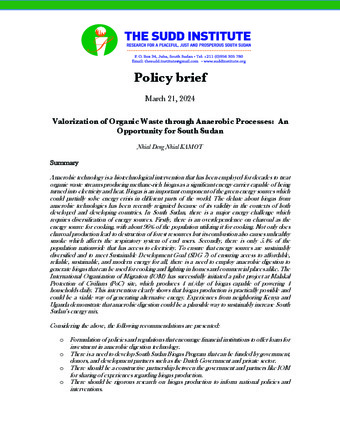Valorization of Organic Waste through Anaerobic Processes: An Opportunity for South Sudan
Publication Summary
Anaerobic technology is a biotechnological intervention that has been employed for decades to treat organic waste streams producing methane-rich biogas as a significant energy carrier capable of being turned into electricity and heat. Biogas is an important component of the green energy sources which could partially solve energy crisis in different parts of the world. The debate about biogas from anaerobic technologies has been recently reignited because of its validity in the contexts of both developed and developing countries. In South Sudan, there is a major energy challenge which requires diversification of energy sources. Firstly, there is an overdependence on charcoal as the energy source for cooking, with about 96% of the population utilizing it for cooking. Not only does charcoal production lead to destruction of forest resources but its combustion also causes unhealthy smoke which affects the respiratory system of end users. Secondly, there is only 5.4% of the population nationwide that has access to electricity. To ensure that energy sources are sustainably diversified and to meet Sustainable Development Goal (SDG 7) of ensuring access to affordable, reliable, sustainable, and modern energy for all, there is a need to employ anaerobic digestion to generate biogas that can be used for cooking and lighting in homes and commercial places alike. The International Organization of Migration (IOM) has successfully initiated a pilot project at Malakal Protection of Civilians (PoC) site, which produces 4 m3/day of biogas capable of powering 4 households daily. This intervention clearly shows that biogas production is practically possible and could be a viable way of generating alternative energy. Experiences from neighboring Kenya and Uganda demonstrate that anaerobic digestion could be a plausible way to sustainably increase South Sudan’s energy mix.
Considering the above, the following recommendations are presented:
- Formulation of policies and regulations that encourage financial institutions to offer loans for investment in anaerobic digestion technology.
- There is a need to develop South Sudan Biogas Program that can be funded by government, donors, and development partners such as the Dutch Government and private sector.
- There should be a constructive partnership between the government and partners like IOM for sharing of experiences regarding biogas production.
There should be rigorous research on biogas production to inform national policies and interventions.
Nhial Deng Nhial Kamot's Biography
Nhial Deng Nhial KAMOT is a research associate at the Sudd Institute, with a broad research interest in resources recovery from waste, drinking water and wastewater treatment, solid waste management, and climate change resilience in South Sudan. At the same time, he is a Lecturer at the University of Juba in the School of Natural Resources and Environmental Studies, department of Environmental Science. He holds a bachelor’s degree in environmental engineering from Akdeniz University and an International Master of Environmental Technology and Engineering from IHE Delft Institute of Water Education in partnership with Ghent University and University of Chemistry and Technology, Prague. He also holds another Master in Innovation and Entrepreneurship from Vlerick Business School.

